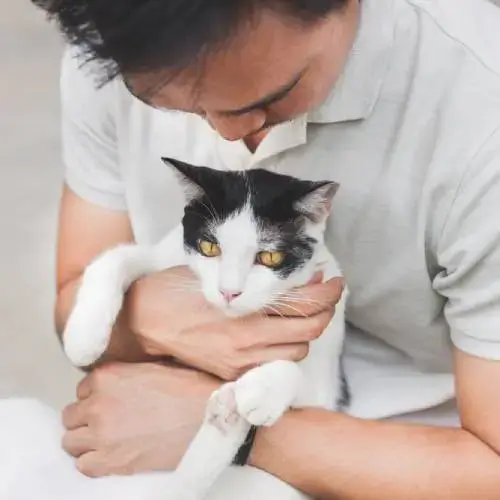Home / Compare Pet Insurance / Pet insurance for senior…

Note: ‘Senior pet insurance’ is not a standalone product but an umbrella term for pet insurance covering senior cats and dogs.
Key takeaways
This guide covers how pet insurance works for senior dogs and cats, including things you need to know when taking out a new policy for a mature pet, including:
- Comprehensive pet insurance is usually available for pets before they turn nine.
- Pets aged nine and over may be insured for accidental injuries but could have limited cover options for illness.
- Pet insurance premiums might increase every year as your pet ages.
Why take out pet insurance for senior cats and dogs?
Cats and dogs often require more veterinary care as they grow older; pet insurance can help by covering a portion of your eligible vet bills. Other benefits of pet insurance for senior pets may include:
- Cover for accidental injuries, including car accidents, poisoning, snake/insect bites and wounds
- Policies for older animals with limited benefits for specified illnesses (age limits apply)
- Being able to choose your own vet or clinic for treatment
- A financial safety net and peace of mind if your senior pet needs emergency care
Choosing pet insurance for senior pets
If you’re looking to buy or switch to a new pet insurance policy for your older furry companion, please consider the following:
- Basic policies for older pets often have a lower benefit percentage (i.e. reimbursement rate), so you’ll have to pay a larger portion of eligible vet bills. For example, you may only be able to claim up to 60% back for eligible treatments, meaning you’d have to foot the remaining 40% of the bill.
- Comprehensive pet insurance is usually available for pets up until they turn nine. If you take out a suitable policy before that, your pooch or feline can be protected for life – if you maintain continuous cover past this age.
- Optional routine care is also available for older pets up to nine years of age as an add-on for new policyholders.
- Some insurers offer accident-only cover for senior pets before or up to 16 years of age. A basic level of cover for injuries will be cheaper than more comprehensive accident and illness cover.
Expert tips for choosing the right insurance for senior pets
Our resident pet insurance expert, Adrian Taylor, has helpful tips for pet owners looking to insure their older companions.

Increase your excess to reduce your premiums
You can reduce your pet insurance costs even if your beloved pet is older or has known health issues that increase your risk of claiming. Some insurers will allow you to pay a higher excess (the amount you contribute towards claims) to reduce your premiums.
Consider benefits limits and sub-limits
Most pet insurance plans have annual benefit limits on vet consultations – how much you can claim on your policy each year − and sub-limits on treatments for conditions. For instance, there might be an annual benefit limit of $10,000 but a $500 sub-limit for tick paralysis treatment.
Be aware of pre-existing conditions
Keep in mind that pre-existing conditions are typically not covered by pet insurance, no matter your level of coverage. A pre-existing condition is often referred to as an illness (or symptoms) that existed or occurred before taking out a policy or during your policy’s mandated waiting period. Insurers may define and approach pre-existing conditions differently, so checking your policy details is important.
About insurance for senior pets
Can I purchase insurance for mature pets?

You’ll generally be able to take out pet insurance for dogs and cats aged nine and over, but you’ll likely be restricted to basic policies that only cover accidental injuries or offer limited coverage for specified illnesses. Similarly, there isn’t a product specifically called ‘senior pet insurance’, so remember this when looking for a policy.
Will insurance premiums for mature pets be more expensive?
While the age of your cat or dog can increase the premium you pay for pet insurance, it’s not the only factor that impacts the cost of a policy. This is why two animals of the same species and age can attract different premiums from separate providers.
Other factors taken into consideration include:
- Your pet insurance claims history
- The breed and species of the animal
- Where you reside
- The gender of the cat or dog
- If the pet has been vaccinated and de-sexed.
Pet insurance companies assess eligibility criteria differently. Read more about how pet insurance premiums are calculated.
Does pet insurance for older cats and dogs cover pre-existing medical conditions?
Insurance providers deal with pre-existing medical conditions differently, but in most cases, they won’t be covered by a policy if:
- You believe your pet has a health condition – regardless of whether a vet has diagnosed them or not
- Your pet has been showing signs or symptoms of a condition before taking out a policy or during your policy’s mandated waiting period.
The above applies to all levels of cover, so it’s recommended to take out pet cover when your pet is young and before they experience health problems – especially if their breed is known to have hereditary issues.
Will pet insurance premiums increase every year?
Pet insurance premiums increase every year, similar to other kinds of insurance. This is due to growing medical costs over time and your pet getting older. Pets face more health complications as they grow older (like humans), and other factors, such as breed or species, increase the risk for insurers.
Can my pet insurance carry over to a new owner?
This can vary between providers, but you can typically transfer your pet insurance plan to a new owner if you can no longer care for your pet. Doing so is particularly handy if you’re giving up an older dog or cat and want to avoid a lapse in their insurance coverage.
An insurer will need the new owner’s contact details and policy payment method, but the new owner should contact them directly for other documentation the insurer may require.
Important to know
Waiting periods

You can be covered for accidents immediately after you take out cover for your senior pet. For illnesses, there’s usually a 30-day waiting period for most conditions, although this will depend on your insurer and policy.
Pet insurance exclusions
Pet insurance for senior pets will likely have more exclusions than a policy for a young pup or kitten. In addition to pre-existing conditions, it’s likely that health problems associated with age like arthritis, cruciate ligament rupture and cancer won’t be covered. Other common pet insurance exclusions include dental care, preventative care (e.g. vaccinations, worming) and artificial limbs.
Age limits
Since pet insurance isn’t community-rated like health insurance for people, providers can limit and restrict the age of pets they offer coverage for when you take out a new policy. The best way to get around this is to purchase a policy when your pet is young and healthy, so there’s cover in place if they become ill or injured in later life. Pet insurance has no age limits if your pet is already insured and you keep paying your premium.
Cover for older and younger pets
It’s a good idea to insure your pet as soon as you welcome them into the family, even if they’re older. A pet policy could be worth its weight in gold if your pet lives to a ripe old age and needs more veterinary care. Pet insurance cover is also worth it if your beloved animal develops a chronic condition that requires ongoing treatment. If you’re getting a new puppy or kitten, you can purchase accident and illness cover for your pet cat or dog from six weeks old. You should at least take out cover within the first year of your pet’s life.
Always read your Product Disclosure Statement (PDS)
Be sure to read the PDS of any insurance product you buy. This document will help you understand the cover you’re applying for and any exclusions that apply.
Meet our pet insurance expert, Adrian Taylor
As Executive General Manager of General Insurance, Adrian Taylor knows that dogs and cats get themselves into all sorts of mischief. One part of Adrian’s work is to help empower consumers to understand how pet insurance can help save them from exorbitant vet bills when their pet gets injured or falls ill.


